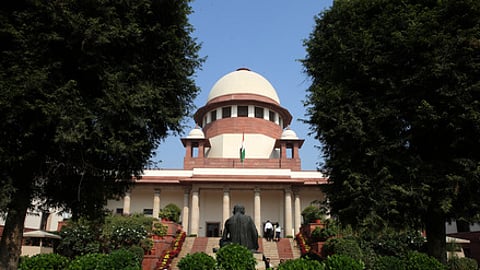

NEW DELHI: Soon after the Supreme Court on Tuesday pronounced the verdict declaring the action of Tamil Nadu Governor to reserving 10 bills for the President was "illegal and arbitrary," Kerala government requested the CJI-led bench to list its writ petition, pending before it, regarding delay by the Governor in giving assent to bills, before the bench headed by Justice J B Pardiwala.
When the matter came up for hearing before a two-judge bench led by the CJI and also comprising Justice Sanjay Kumar, former Attorney General (AG) and senior lawyer, K K Venugopal, appearing for the Kerala state, pleaded to the apex court to list this matter before the bench led by Justice Pardiwala. "For the last three years, bills have been pending," Venugopal told the bench.
The CJI Sanjiv Khanna, however, after hearing Venugopal's arguments, deferred the hearing to another date, citing his retirement mid-May. The bench said it has listed tentatively on May 13, possibly before another bench. It did not specify whether the plea would be before Justice Pardiwala or not, in spite of the repeated requests made by Venugopal for listing the same before Justice Pardiwala bench.
Venugopal argued that seven bills were pending with the state's Governor. He highlighted that the SC's judgment in the Tamil Nadu case adequately covered the state's problem with its own Governor.
The CJI, however, clarified that the judgment has been pronounced today in the morning and we will know about the contents and the directions given in the judgment.
The Kerala government moved the apex court last year, claiming the Governor's inaction regarding several bills passed by the state legislature.
The Supreme Court had earlier issued a notice to the Centre and Additional Chief Secretary to the Kerala Governor and asked them to file a detailed reply.
Kerala government had moved the SC challenging the governor's decisions to keep several bills pending for months, either refusing to assent them or reserving them for the President's consideration.
Venugopal had earlier pleaded to the apex court that there was a need for the Court to lay down guidelines on this issue pertaining to when the Governors can return/refer bills.
"This is a confusion in the minds of various Governors in the country as to what their powers are in regard to assenting to bills. In the present (Kerala) case, out of eight bills, two of them had been kept pending for 23 months. One for 15 months. Another for 13 months. And others for 10 months. It is a very sad state of affairs. This is a confusion among the Governors that they keep bills pending. This is against the constitution," the senior lawyer had told the apex court.
Venugopal had further said that this court should tell the Governor as to when they can refuse to assent and when they can refer to the President.
In its petition filed under Article 32 of the Constitution before the top court, Kerala govt challenged the reconsideration and action of President Droupadi Murmu in withholding assent for four out of the seven bills referred by the Kerala Governor.
The Kerala government also challenged the governor's action of referring the bills to the President, arguing that none of the bills related to Centre-State relations required the Presidential assent.